全英文介绍 中国哲学
中国文化概况哲学和宗教 英文版_图文
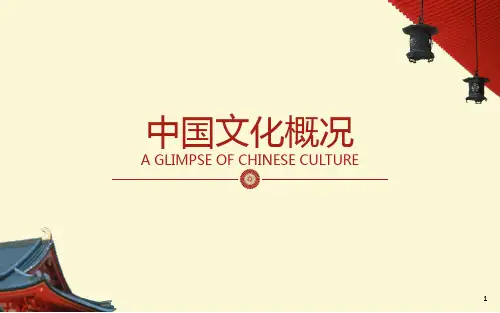
“words versus ideas”
“fundamentals versus practice”
“ethics versus nature”, etc.
17
The Development of Chinese Philosophy
Orthodox Philosophy During the Han Dynasty ( 两汉经学)
The philosophy in Pre-Qin times
The philosophy in Pre-Qin times was marked by the emergence of various ancient philosophical views.
The most influential schools were Confucianism (儒家), Taoism (道家), Mohism (墨家) and Legalism (法家)
中国文化概况
A GLIMPSE OF CHINESE CULTURE
1
Philosophy and
Religions
2
学习目标
了解中国古代哲学发展及内容; 掌握中国主要宗教的基本概况; 继承和发扬中国传统美德。
3
Overview
Lead-in Activity
Text Study
Discussion & Presentation
The Development of Chinese Philosophy The Basic Features of Chinese Ancient
Philosophy Characteristics of Chinese Ethics and
中国哲学文化主题英语作文
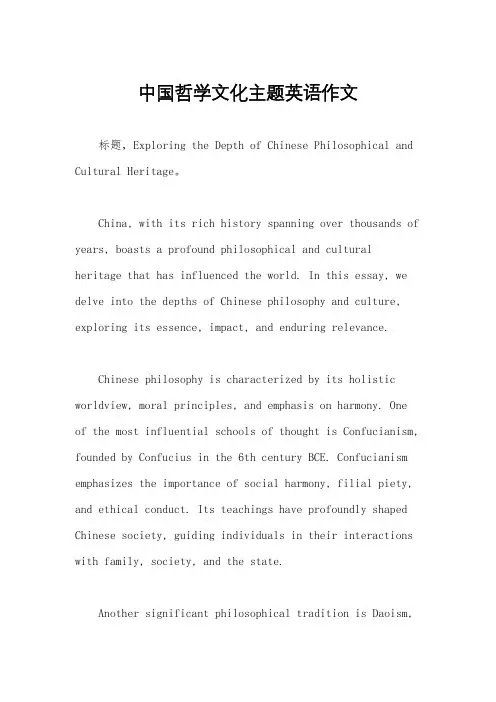
中国哲学文化主题英语作文标题,Exploring the Depth of Chinese Philosophical and Cultural Heritage。
China, with its rich history spanning over thousands of years, boasts a profound philosophical and cultural heritage that has influenced the world. In this essay, we delve into the depths of Chinese philosophy and culture, exploring its essence, impact, and enduring relevance.Chinese philosophy is characterized by its holistic worldview, moral principles, and emphasis on harmony. One of the most influential schools of thought is Confucianism, founded by Confucius in the 6th century BCE. Confucianism emphasizes the importance of social harmony, filial piety, and ethical conduct. Its teachings have profoundly shaped Chinese society, guiding individuals in their interactions with family, society, and the state.Another significant philosophical tradition is Daoism,attributed to Laozi and Zhuangzi. Daoism advocates for living in accordance with the Dao, or the Way, which emphasizes spontaneity, simplicity, and naturalness. Daoist philosophy encourages individuals to embrace the ebb and flow of life, cultivating a sense of inner peace and harmony with the universe.Furthermore, Chinese philosophy encompasses the teachings of Legalism, which focuses on the importance of strict laws and centralized authority to maintain social order. Legalist principles have played a crucial role in shaping China's governance and legal system throughout its history.In addition to philosophy, Chinese culture encompasses a diverse array of artistic, literary, and spiritual traditions. Traditional Chinese art, including painting, calligraphy, and poetry, reflects themes of nature, spirituality, and the human experience. Chinese literature, dating back to ancient classics such as "The Book of Songs" and "The Analects," provides insights into the values, beliefs, and aspirations of Chinese civilization.Moreover, Chinese cultural heritage includestraditional festivals, such as the Spring Festival (Chinese New Year), Mid-Autumn Festival, and Dragon Boat Festival, which celebrate familial bonds, agricultural traditions, and mythological folklore. These festivals serve as occasions for communal celebration, reflection, and the transmission of cultural values from one generation to the next.The enduring legacy of Chinese philosophy and culture extends far beyond the borders of China, influencing neighboring countries and global discourse. The spread of Confucianism, Daoism, and other Chinese philosophical traditions has left an indelible mark on East Asian societies, shaping their values, social norms, and institutions.In the modern era, China's philosophical and cultural heritage continues to inspire scholars, artists, and thinkers around the world. The principles of Confucian ethics, Daoist spirituality, and Legalist governance remainrelevant in addressing contemporary challenges such as environmental sustainability, social justice, and global governance.In conclusion, Chinese philosophy and culture represent a treasure trove of wisdom, insight, and inspiration that continues to resonate with people across the globe. By exploring the depth of China's philosophical and cultural heritage, we gain a deeper understanding of humanity's collective heritage and the enduring quest for harmony, wisdom, and moral excellence.。
中国的哲学英语作文
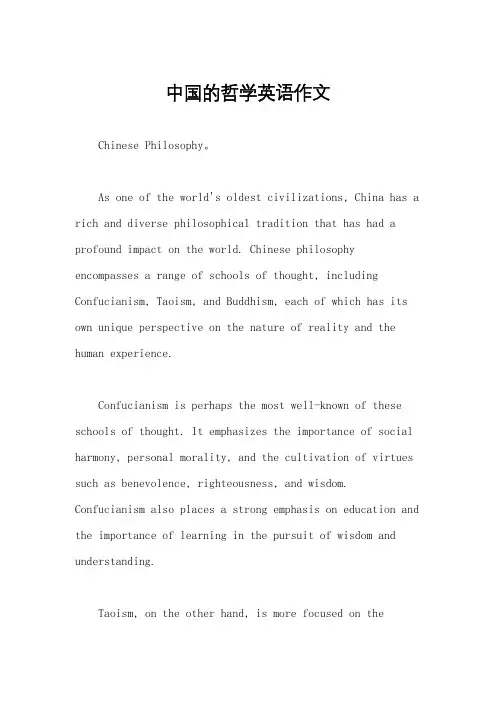
中国的哲学英语作文Chinese Philosophy。
As one of the world's oldest civilizations, China has a rich and diverse philosophical tradition that has had a profound impact on the world. Chinese philosophy encompasses a range of schools of thought, including Confucianism, Taoism, and Buddhism, each of which has its own unique perspective on the nature of reality and the human experience.Confucianism is perhaps the most well-known of these schools of thought. It emphasizes the importance of social harmony, personal morality, and the cultivation of virtues such as benevolence, righteousness, and wisdom. Confucianism also places a strong emphasis on education and the importance of learning in the pursuit of wisdom and understanding.Taoism, on the other hand, is more focused on theindividual's relationship with the natural world. It emphasizes the importance of living in harmony with nature and the need to cultivate a sense of inner peace and tranquility. Taoism also emphasizes the importance of spontaneity and intuition, and encourages individuals to trust their own instincts and follow their own path in life.Buddhism, which originated in India but has had a significant impact on Chinese philosophy, focuses on the nature of suffering and the pursuit of enlightenment. It teaches that suffering is caused by attachment to material things and desires, and that the path to enlightenment involves letting go of these attachments and cultivating compassion and wisdom.Despite their differences, these three schools of thought share a common emphasis on the importance of self-cultivation, the pursuit of wisdom and understanding, andthe cultivation of virtues such as compassion, benevolence, and wisdom. They also share a belief in the interconnectedness of all things and the importance ofliving in harmony with the natural world.In conclusion, Chinese philosophy is a rich and diverse tradition that has had a profound impact on the world. It offers a unique perspective on the nature of reality and the human experience, and emphasizes the importance ofself-cultivation, the pursuit of wisdom and understanding, and the cultivation of virtues such as compassion, benevolence, and wisdom.。
中国传统文化-中国哲学英文
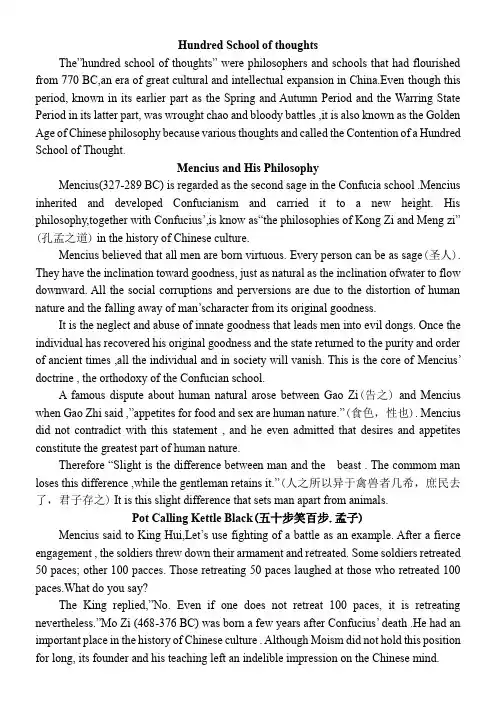
Hundred School of thoughtsThe”hundred school of thoughts” were philosophers and schools that had flourished from 770 BC,an era of great cultural and intellectual expansion in China.Even though this period, known in its earlier part as the Spring and Autumn Period and the Warring State Period in its latter part, was wrought chao and bloody battles ,it is also known as the Golden Age of Chinese philosophy because various thoughts and called the Contention of a Hundred School of Thought.Mencius and His PhilosophyMencius(327-289 BC) is regarded as the second sage in the Confucia school .Mencius inherited and developed Confucianism and carried it to a new height. His philosophy,together with Confucius’,isknowas“the philosophies of Kong Zi and Meng zi”(孔孟之道) in the history of Chinese culture.Mencius believed that all men are born virtuous. Every person can be as sage(圣人). They have the inclination toward goodness, just as natural as the inclination ofwater to flow downward. All the social corruptions and perversions are due to the distortion of human nature and the falling away of man’scharacter from its original goodness.It is the neglect and abuse of innate goodness that leads men into evil dongs. Once the individual has recovered his original goodness and the state returned to the purity and order of ancient times ,all the individual and insociety will vanish. This is the core ofMencius’ doctrine , the orthodoxy of theConfucian school.A famous dispute about human natural arose between Gao Zi(告之)and Mencius when Gao Zhi said ,”appetites for food and sex are human nature.”(食色,性也). Mencius did not contradict with this statement , and he even admitted that desires and appetitesconstitute the greatest part of human nature.Therefore “Slight is the difference between man and the beast . The commom man loses this difference ,while the gentleman retains it.”(人之所以异于禽兽者几希,庶民去了,君子存之) It is this slight difference that sets man apart from animals.Pot Calling Kettle Black(五十步笑百步.孟子)Mencius said to King Hui,Let’s use fighting of a battle as an example. After a fier ce engagement , the soldiers threw down their armament and retreated.Some soldiers retreated 50 paces; other 100 pacces. Those retreating 50 paces laughed at those who retreated 100 paces.What do you say?The King replied,”No. Even if one does not retreat 100 paces, it is retreating nevertheless.”MoZi (468-376 BC) was born a few years after Confucius’ death .He had an important place in the history of Chinese culture . Although Moism did not hold this position for long, its founder and his teaching left an indelible impression on the Chinesemind.The core of Moism is “universal love(兼爱)”, close to the assertion that “all men equal before God.”In his life time , rulers of the feudal states , to satisfy their endless material needs , sought after aggressive wars of annexation at the sacrifice of their neighbors, thus bringing the people into disastrous impasse.Mo Zi, standing by the common people, claimed the right 0f survival for the people and the weak and small states. He advocated economy and thrift . He condemned all forms of ritual, extravagant funerals, expensive entertainment, and offensive warfare , which would deteriorate the feeding ,cloth common people.In contrast to those of Confucius, Mo Zi’s moral teachings emphasized self-reflection and authenticity rather than obedience to ritual. He observed that we often learn about the world through adversity.By reflection on one’s own su ccesses and failures , one attains ture self-knowledge rather than mere conformity with ritual . Mo Zi exhorted the gentleman to lead a life of asceticism and self-restraint ,renouncingboth material and spiritual extravagance.。
写一篇关于中国哲学的英语作文
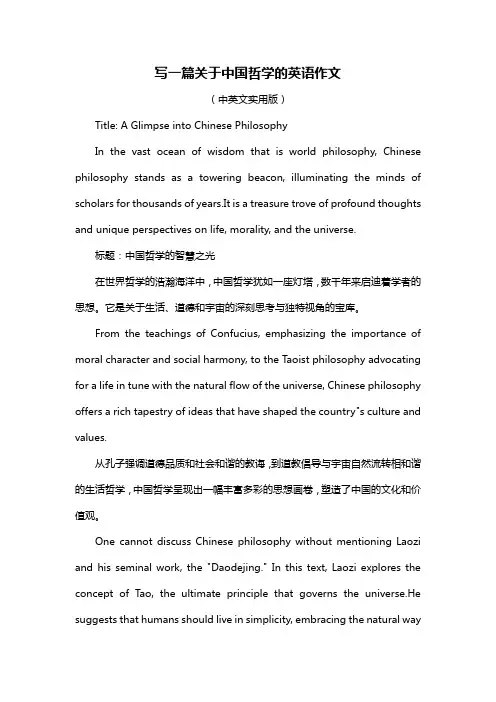
写一篇关于中国哲学的英语作文(中英文实用版)Title: A Glimpse into Chinese PhilosophyIn the vast ocean of wisdom that is world philosophy, Chinese philosophy stands as a towering beacon, illuminating the minds of scholars for thousands of years.It is a treasure trove of profound thoughts and unique perspectives on life, morality, and the universe.标题:中国哲学的智慧之光在世界哲学的浩瀚海洋中,中国哲学犹如一座灯塔,数千年来启迪着学者的思想。
它是关于生活、道德和宇宙的深刻思考与独特视角的宝库。
From the teachings of Confucius, emphasizing the importance of moral character and social harmony, to the Taoist philosophy advocating for a life in tune with the natural flow of the universe, Chinese philosophy offers a rich tapestry of ideas that have shaped the country"s culture and values.从孔子强调道德品质和社会和谐的教诲,到道教倡导与宇宙自然流转相和谐的生活哲学,中国哲学呈现出一幅丰富多彩的思想画卷,塑造了中国的文化和价值观。
One cannot discuss Chinese philosophy without mentioning Laozi and his seminal work, the "Daodejing." In this text, Laozi explores the concept of Tao, the ultimate principle that governs the universe.He suggests that humans should live in simplicity, embracing the natural wayof things, and avoiding excessive desires and actions.谈论中国哲学,不得不提老子及其杰作《道德经》。
介绍中国古代哲学英语作文200词
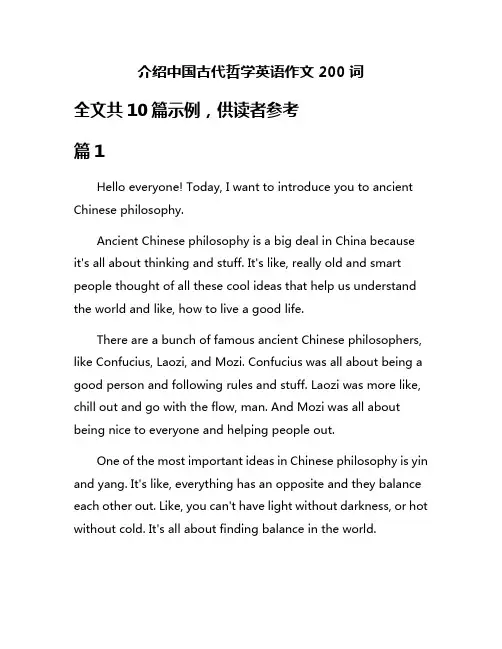
介绍中国古代哲学英语作文200词全文共10篇示例,供读者参考篇1Hello everyone! Today, I want to introduce you to ancient Chinese philosophy.Ancient Chinese philosophy is a big deal in China because it's all about thinking and stuff. It's like, really old and smart people thought of all these cool ideas that help us understand the world and like, how to live a good life.There are a bunch of famous ancient Chinese philosophers, like Confucius, Laozi, and Mozi. Confucius was all about being a good person and following rules and stuff. Laozi was more like, chill out and go with the flow, man. And Mozi was all about being nice to everyone and helping people out.One of the most important ideas in Chinese philosophy is yin and yang. It's like, everything has an opposite and they balance each other out. Like, you can't have light without darkness, or hot without cold. It's all about finding balance in the world.Another cool idea is the five elements, like wood, fire, earth, metal, and water. They're super important in Chinese philosophy because they help explain how everything in the world is connected and like, how things change and grow.So yeah, ancient Chinese philosophy is really fascinating and has a lot of great ideas that can help us understand the world and live our best lives. Thanks for listening!篇2Hey guys, do you know about ancient Chinese philosophy? Let me introduce it to you in a fun and easy way!Ancient Chinese philosophy is a big part of Chinese culture and history. It includes many different schools of thought like Confucianism, Taoism, and Legalism. These philosophies were developed by wise people in ancient China who tried to figure out how to live a good life and create a harmonious society.Confucianism, founded by Confucius, is all about respecting your elders, being kind to others, and following traditions. Confucius believed that if everyone behaved morally and treated each other with respect, society would be peaceful and prosperous.Taoism, founded by Laozi, focuses on living in harmony with the Tao, or the natural way of the universe. Taoists believe in simplicity, humility, and living in the moment. They think that by letting go of desires and expectations, people can find true happiness and inner peace.Legalism, on the other hand, emphasizes strict laws and harsh punishments to maintain order in society. Legalists believe that people are naturally selfish and need strong rulers to keep them in line.These three philosophies have had a big impact on Chinese culture and still influence people's beliefs and values today. So next time you hear about ancient Chinese philosophy, you'll know a little bit more about what it's all about!篇3Title: Introduction to Ancient Chinese PhilosophyHey guys! Today, I'm going to talk to you about something super cool - Ancient Chinese Philosophy! It's like, way back in the day, people in China were thinking super deep thoughts about life and stuff. Let me tell you all about it.One of the most famous ancient Chinese philosophers is Confucius. He was all about teaching people how to be good and moral. He said things like, "Do not do to others what you do not want done to yourself." Basically, he wanted everyone to treat each other with respect and kindness.Another famous philosopher is Laozi, who came up with Daoism. He believed in living in harmony with nature and finding balance in life. He said things like, "Nature does not hurry, yet everything is accomplished." It's all about going with the flow and finding peace within yourself.Then there's Mozi, who believed in universal love and helping others. He said, "If people desired earnestly to practice benevolence and righteousness, all would be well with them." It's all about being kind and caring for others.And finally, we have Sun Tzu, who wrote "The Art of War." He was all about strategies and tactics, and he said things like, "The supreme art of war is to subdue the enemy without fighting." It's all about being smart and clever in how you handle things.So, there you have it - Ancient Chinese Philosophy in a nutshell! It's all about being good, finding balance, showing love, and being strategic. Pretty cool, right? Keep on thinking deep thoughts, little philosophers!篇4Hey guys, do you know about ancient Chinese philosophy? Today, I'm going to introduce you to some of the most famous ancient Chinese philosophers and their ideas.First, let's talk about Confucius. Confucius was a great thinker and educator who lived in China over 2,500 years ago. He believed in the importance of traditional values like respect for elders and family loyalty. Confucius also stressed the importance of education and self-improvement.Next, we have Laozi, the founder of Taoism. Laozi believed in living in harmony with nature and finding inner peace. He wrote the Tao Te Ching, a book of wisdom that teaches us to live a simple and humble life.Another famous ancient Chinese philosopher is Mozi. Mozi was a philosopher who believed in universal love and equality. He promoted the idea of treating others with kindness and fairness, regardless of their social status.Lastly, we have Sun Tzu, the author of The Art of War. Sun Tzu was a military strategist who wrote the famous book on warfare and strategy. He believed in the importance of careful planning and strategy in battle.Overall, ancient Chinese philosophy is rich in wisdom and has had a profound influence on Chinese culture and society. These philosophers have left us with valuable teachings that are still relevant today. So, let's take a moment to learn from their ideas and apply them to our own lives.篇5Hello everyone! Today I want to introduce you to ancient Chinese philosophy. In ancient China, many great thinkers and philosophers had their own ideas about how people should live their lives and understand the world. Let's take a look at some of the most famous philosophies from ancient China.First, there was Confucianism, which was founded by Confucius. Confucius believed in the importance of family, respect for elders, and moral behavior. He taught that people should follow the principles of propriety, righteousness, and sincerity to create a harmonious society. Confucianism has had a huge impact on Chinese culture and society for thousands of years.Next, there was Taoism, which was founded by Laozi. Laozi believed in living a simple and natural life, in harmony with the Tao, or the way of the universe. He taught that by letting go ofdesires and living in the present moment, people could find peace and happiness. Taoism emphasizes the importance of balance and moderation in all things.Another important philosophy is Legalism, which was founded by Han Feizi. Legalism focused on strict laws and harsh punishments to maintain order and control in society. Legalist thinkers believed that people were inherently selfish and needed to be controlled by a strong central government. Legalism had a big influence on the governance of ancient China.Finally, there was Mohism, founded by Mozi. Mozi believed in universal love and impartiality, and taught that people should treat others with kindness and compassion. He also emphasized the importance of frugality and simplicity in daily life. Mohism promoted the idea of mutual benefit and cooperation to create a peaceful world.These are just a few of the many philosophies from ancient China. Each of these philosophies had a unique perspective on how people should live and interact with each other. Studying ancient Chinese philosophy can help us learn valuable lessons about ethics, morality, and the nature of the human experience. Let's continue to explore the wisdom of the past and apply it to our lives today. Thank you for listening!篇6Ancient Chinese philosophy is really cool and interesting! It's all about thinking deep and trying to figure out the meaning of life and the universe. There are so many famous philosophers in ancient China, like Confucius, Laozi, and Zhuangzi.Confucius was all about moral values and ethics. He believed in treating others with respect and kindness. One of his famous sayings is, "Do not do to others what you would not want done to yourself." This means we should treat others the way we want to be treated. Pretty simple, right?Laozi, on the other hand, was all about nature and harmony. He believed in living in harmony with the natural world and letting things happen as they are supposed to. One of his famous sayings is, "Nature does not hurry, yet everything is accomplished." This means we should go with the flow and not try to force things to happen.Zhuangzi was a bit more laid back and believed in living life to the fullest. He told stories to teach his philosophy, like the famous story of the butterfly dream. In this story, Zhuangzi dreamt he was a butterfly, and when he woke up, he wasn't sureif he was a man who dreamt he was a butterfly or a butterfly dreaming he was a man. Pretty mind-blowing, right?Overall, ancient Chinese philosophy is all about finding balance, living in harmony, and being a good person. It's a really cool way of thinking, and I think we can all learn a lot from these wise old philosophers.篇7Introduction to Ancient Chinese PhilosophyHey guys, today I want to talk about ancient Chinese philosophy. It's like, this super cool way of thinking that people from China way back in the day used to figure out how to live their lives and understand the world. It's totally mind-blowing!So, ancient Chinese philosophy is all about trying to understand the world and how everything works. One of the most famous dudes in ancient Chinese philosophy is Confucius. He was all about being kind and respectful to others, and he believed that if everyone did that, the world would be a better place. He also talked a lot about treating your family with love and respect.Then there's Laozi, who was all about living in harmony with nature. He thought that living a simple life and going with the flow of things was the key to happiness. He even wrote a book called the Tao Te Ching, which has tons of wise sayings about how to live a good life.Oh, and let's not forget about Mozi, who believed in the power of love and kindness. He thought that everyone should treat each other with compassion and help out those in need. Super important stuff, right?There are lots of other ancient Chinese philosophers too, each with their own ideas and beliefs. But the cool thing is that they all wanted to make the world a better place and help people live happy, fulfilling lives. How awesome is that?So yeah, that's a little introduction to ancient Chinese philosophy. It's all about being kind, respectful, and living in harmony with the world. Pretty rad, huh? Let's all try to be a little more like those ancient Chinese philosophers and make the world a better place!篇8Title: Introduction to Ancient Chinese PhilosophyHey guys, do you know about ancient Chinese philosophy? It's super cool and interesting! Ancient Chinese philosophy is all about thinking about life, the world, and how to be a good person. There are many famous philosophers in ancient China, like Confucius, Laozi, and Mozi.Confucius, also known as Kongzi, believed in the importance of family, respect for elders, and having good manners. He thought that everyone should follow the "Five Constant Virtues" which are benevolence, righteousness, propriety, wisdom, and faithfulness. Confucius wanted people to be kind, respectful, and honest with each other.Laozi, on the other hand, was all about nature and living in harmony with the universe. He founded Daoism, which teaches people to live a simple life, go with the flow, and find peace within themselves. Laozi believed that everything in the world is connected and that we should embrace the natural way of things.Mozi, another great philosopher, focused on universal love and the importance of treating everyone equally. He believed in promoting peace, helping others, and getting rid of selfishness. Mozi thought that everyone should care for each other and work together to create a better world.There are many more ancient Chinese philosophers with different ideas and beliefs, but they all share the common goal of seeking truth, wisdom, and happiness. Their teachings have influenced Chinese culture and society for thousands of years.So, next time you're thinking about life and how to be a better person, remember the wisdom of ancient Chinese philosophy. It's full of amazing insights and valuable lessons that can guide us in our own journeys. Cool, right?篇9Title: Introduction to Ancient Chinese PhilosophyHey guys! Today I'm going to talk about Ancient Chinese Philosophy. Ancient Chinese philosophy has a long history and has greatly influenced Chinese culture and way of thinking. There are three main schools of thought in ancient Chinese philosophy: Confucianism, Taoism, and Legalism.Confucianism, founded by Confucius, emphasizes the importance of social harmony and moral values. Confucius believed in the concept of filial piety, respect for elders, and the importance of rituals and ceremonies. He also emphasized the importance of education and self-improvement. Confucianismhas had a profound impact on Chinese society and is still influential today.Taoism, founded by Laozi, focuses on living in harmony with the Tao, or the way of nature. Taoists believe in simplicity, spontaneity, and naturalness. They emphasize the concept of Wu Wei, or non-action, and seek to achieve balance and harmony in life. Taoism has influenced Chinese art, literature, and medicine.Legalism, founded by Han Feizi, is based on the belief that humans are inherently selfish and greedy. Legalists believe in strict laws and harsh punishments to maintain social order and stability. They emphasize the importance of a strong central government and the use of rewards and punishments to control people's behavior.In conclusion, Ancient Chinese philosophy has played a crucial role in shaping Chinese culture and societal norms. Each school of thought offers its own unique perspective on life, morality, and governance. By studying these philosophies, we can gain a deeper understanding of Chinese history and tradition. So next time you hear about Confucius, Laozi, or Han Feizi, remember the impact they have had on Chinese philosophy!篇10Title: Introduction to Ancient Chinese PhilosophyHey guys! Today I'm going to talk to you about ancient Chinese philosophy. Have you ever heard of Confucius, Laozi, or Zhuangzi? They're some famous ancient Chinese philosophers who had a lot of cool ideas about life and stuff.First, let's talk about Confucius. He was all about being a good person and treating others with respect. Confucius believed in things like filial piety (being good to your parents) and loyalty to your friends and family. He also thought it was important to follow tradition and do your best in everything you do.Then there's Laozi, who was all about going with the flow and living in harmony with nature. He wrote the Tao Te Ching, which is a book all about how to live a balanced and peaceful life. Laozi believed that the Tao, or the way of nature, was the key to finding inner peace and happiness.Finally, we have Zhuangzi, who was all about questioning reality and seeing things from different perspectives. He wrote a bunch of funny and clever stories that make you think about the world in a whole new way. Zhuangzi believed that true freedom came from accepting the natural order of things and letting go of your own desires.So that's a quick intro to ancient Chinese philosophy! It's pretty cool to think about how these old dudes were talking about all the same stuff we think about today. Maybe we can learn something from them and live better lives too. Thanks for listening!。
中国哲学词汇术语英语作文
中国哲学词汇术语英语作文Title: Exploring Chinese Philosophical Terminology in English。
Introduction。
Chinese philosophy boasts a rich tradition spanning thousands of years, encompassing diverse schools of thought such as Confucianism, Daoism, and Legalism. Understanding Chinese philosophical concepts requires delving into their unique terminologies, which often pose challenges in translation. In this essay, we will explore key Chinese philosophical terms and their English equivalents, shedding light on the nuances of cross-cultural interpretation.Confucianism。
1. Ren (仁)。
Ren, often translated as "benevolence" or"humaneness," embodies the highest moral virtue in Confucian ethics. It encompasses compassion, kindness, and the cultivation of virtuous character.2. Li (礼)。
Li refers to ritual propriety, encompassing proper conduct, etiquette, and manners. It emphasizes the importance of social harmony and hierarchical relationships within society.3. Xiao (孝)。
中国文化概况哲学和宗教英文版
中国文化概况哲学和宗教英文版Chinese Culture Overview: Philosophy and ReligionPhilosophy:Confucianism is one of the most influential philosophies in Chinese history. Founded by Confucius during the Spring and Autumn Period (771 - 476 BCE), it focuses on moral values,social hierarchies, and the importance of education. Confucianism emphasizes the cultivation of virtues such as benevolence, righteousness, and filial piety. It has greatly influenced the development of Chinese governance, family ethics, and education systems.Taoism, founded by Lao Tzu during the 6th century BCE, explores the concept of the Tao, meaning "The Way." It emphasizes living in harmony with nature and the pursuit ofself-realization. Taoism encourages individuals to live a simple and balanced life, while seeking to attain immortality through spiritual practices such as meditation and martial arts. Its teachings have had a profound influence on Chinese literature, art, and traditional medicine.Legalism, originating during the Warring States Period (475 - 221 BCE), takes a more pragmatic approach to governance and social order. It emphasizes strict laws, harsh punishments, and the idea that human nature is inherently selfish and corrupt.Legalism played an important role in shaping the centralized autocracy of ancient China and laid down the foundation for the Qin Dynasty's legalistic governance.Mohism, founded by Mozi in the 5th century BCE, promotes universal love and altruism. Mohism advocates for impartiality and rejecting the discrimination based on social status. The philosophy emphasizes the practical application of moral principles for the benefit of society, calling for the equal distribution of resources and pacifism.Religion:Religion in China is diverse and multifaceted. The major religions practiced in China include Buddhism, Taoism, Confucianism, Islam, and Christianity.Taoism, as mentioned earlier, is both a philosophy and a religion. Taoist practices involve the worship of deities, participation in rituals, and the pursuit of immortality through meditation and alchemy. Taoist temples, many of which are located in natural landscapes, are important cultural and spiritual landmarks in China.Confucianism, although primarily a philosophy, incorporates certain religious elements. Ancestor worship is an integral part of Confucianism, as it emphasizes filial piety and respect for one's ancestors. Confucian temples and ancestral halls can befound throughout China, where rituals and ceremonies are conducted to honor and remember ancestors.Christianity arrived in China during the Tang Dynasty and has since grown steadily. Today, there are both official and unofficial Christian churches in China, with the officially recognized churches being regulated by the state. Chinese Christians practice their faith while incorporating Chinese cultural traditions, creating a distinct form of Chinese Christianity.In conclusion, Chinese philosophy and religion have significantly influenced the culture, values, and social structures of China. Confucianism, Taoism, Buddhism, and other unique philosophies have shaped Chinese attitudes towards morality, governance, and spirituality. Similarly, a variety of religions have found their place in Chinese society, enhancing the diversity and richness of Chinese culture.。
写一篇关于中国哲学的英语作文
写一篇关于中国哲学的英语作文English:China has a rich history of philosophy that dates back thousands of years. Chinese philosophy is characterized by its focus on harmony, balance, and interconnectedness with nature. One of the most influential philosophers in Chinese history is Confucius, whose teachings emphasize the importance of moral values, social harmony, and filial piety. Another prominent school of thought is Daoism, founded by Laozi, which advocates for living in harmony with the natural flow of existence and embracing simplicity and spontaneity. Additionally, Chinese philosophy also includes the teachings of Mozi, who emphasized universal love and frugality, as well as the legalistic school of thought, which stresses the rule of law and the need for a strong central government. Overall, Chinese philosophy offers a diverse range of perspectives on how to live a meaningful and fulfilling life, emphasizing moral values, social order, and personal integrity.Translated content:中国拥有悠久的哲学历史,可以追溯到数千年前。
中国的古代哲学英语作文170词
中国的古代哲学英语作文170词Ancient Chinese PhilosophyAncient Chinese philosophy has a rich and profound history, influencing not only China but also the world. With its unique cultural background, Chinese philosophy has made significant contributions to human thought. This essay will explore several key aspects of ancient Chinese philosophy, including its main schools of thought, influential philosophers, and the enduring legacy it left behind.Confucianism, as one of the oldest and most influential philosophical traditions, emphasizes the cultivation of moral character and the pursuit of social harmony. Confucius, the founder of Confucianism, believed in the importance of moral conduct, filial piety, and respect for authority. He stressed the significance of ethical relationships, such as the five constant virtues: benevolence, righteousness, propriety, wisdom, and trustworthiness. Confucianism played a crucial role in shaping Chinese culture and society, providing guidance on how individuals should live and interact with others.Taoism, founded by Laozi, focuses on living in harmony with the Tao, which is often translated as "the way." Taoists believe in the natural flow of life and the importance of finding balance and simplicity. The central concept of Taoism is the idea of wu-wei, or effortless action, which suggests that individuals should align themselves with the natural order of the universe. Taoism emphasizes the cultivation of inner peace and personal transformation, encouraging individuals to follow their intuition and let go of attachments.Another significant school of thought is Legalism, which advocates for strict adherence to laws and regulations. Legalists believe that human nature is inherently selfish and that strong central authority and harsh punishments are necessary to maintain order and stability in society. Legalism played a crucial role during the Qin Dynasty, helping establish a centralized and autocratic government.In addition to these major philosophical schools, there are also various other schools that have contributed to the development of Chinese philosophy, such as Mohism, Yin-Yang School, and School of Names. Each school has its unique perspectives, exploring different aspects of human nature, society, and governance.Chinese philosophy has not only influenced the foundations of Chinese civilization but also found resonance among philosophers and scholars worldwide. Its ideas, such as the pursuit of harmony, ethical conduct, and the wisdom of the ancients, continue to inspire people today. Many concepts from Chinese philosophy have been incorporated into other disciplines, such as medicine, martial arts, and even leadership.In conclusion, ancient Chinese philosophy encompasses various schools of thought, with Confucianism, Taoism, and Legalism being the most prominent. These philosophical traditions have profoundly shaped Chinese culture, providing guidance on ethical conduct, personal cultivation, and governance. The enduring legacy of Chinese philosophy continues to inspire and influence people around the globe, reflecting the richness and depth of Chinese intellectual heritage.。
- 1、下载文档前请自行甄别文档内容的完整性,平台不提供额外的编辑、内容补充、找答案等附加服务。
- 2、"仅部分预览"的文档,不可在线预览部分如存在完整性等问题,可反馈申请退款(可完整预览的文档不适用该条件!)。
- 3、如文档侵犯您的权益,请联系客服反馈,我们会尽快为您处理(人工客服工作时间:9:00-18:30)。
friendship of the good. When he has time and
opportunity, after the performance of these
things, he should employ them in polite studies.“( 子曰:“弟子,入则孝,出则弟,谨而 信,凡爱众,而亲仁。行有余力,则以
The orthodox philosophy during the Han Dynasty(两汉经学)
Metaphysic during the Wei and Jin dynasties(魏晋玄学)
The Buddhist philosophy during the Sui and Tang dynasties (隋唐佛学)
Practice
“To prefer it is better than only to know it. To delight in it is better than merely to prefer it.”(这里的践履并非人类的生产实践,而是偏重于个人的修德重行。 )
Morality
Monarch’s benevolence and lower officials’ loyalty, fathers’ kindness and sons’ filial
will be lazy.(学而不思则罔,思而不学则殆。 )
2. Whatdo not do to others.(己所不欲勿施于人。 )
3. Reviewing what you have learned and learning new ones, you can be my
piety, elder brothers’ friendliness and younger ones’ respect, and friends’ mutual trust.(中国古代哲学从本质上讲可以说是一种道德哲学。)
Harmony Harmony between man and nature and also between man and man.(中庸之道是中国
search for spiritual freedom and Buddhism’s “Nirvana” all reflect their pursuit of the complete spiritual happiness.(把儒家的真性、道家的飘逸、佛教的超脱融合起来,就
可以体会出中国古代人生哲学的境界。)
Period and enjoyed thriving development because of the emergence of the “a hundred schools of thought contend” during the Warring States Period.
The Development of Ancient Chinese Philosophy
2. Collectivism over individualism
Traditional Chinese values attach great importance to collective interest. An individual’s value can be realized only within society as a whole, as that is
贤思齐焉,见不贤而内自省也。” ) 3. The master said, “if a man take no thought
about what is distant, he will find sorrow near
at hand.” (子曰∶“人无远虑,必有近忧。”)
Characteristics of Chinese Ethics and Morality
Chinese culture
Winston Sun
Education
He established first private school in China and accepted the students from everywhere.
Subjects: Manners, Music, Literature, Riding, Archery and Mathematics (礼,乐,射,御,书,数)
teacher.(温故而知新可以为师矣。)
Winston Sun
Stress on spiritual existence Stress on practice Stress on morality Stress on harmony Stress on intuition
Spiritual existence Confucianism’s knowledge of life through disposition and consciousness, Taoism’s
He have 3000 students. Among them, 72 became famous scholars.
Winston Sun
Winston Sun
1. To study but not think, you will be confused. Just to think but not study, you
Chinese philosophy has developed over several thousand of years. Its
origin can be traced back to the Xia, Shang, and Zhou dynasties. It begin to take definite shapes during the Spring and Autumn
Ethics is the moral principle for dealing with people.
Morality is a social ideology which serves as the norms for people’s lives and behaviours.
Question: the three obediences and four virtues? the three basic rules and five
古代哲学的基本精神之一。)
Intuition
The philosophical ideas were formed based on intuition and reflection on life’s experiences.(这些哲学思想是哲学家们所得所悟的思维以及直觉体验的结晶,无论是 影响深远“天人合一”、“道”,还是孟子所讲的尽心、知性、知天,养“浩然之 气”,庄子讲“天地与我并生,万物与我为一”,魏晋玄学家讲“言不尽意”,“ 得意忘象”,都是一种并不能由语言概念来确指、来表现,而只能靠主体依其价值
取向在经验范围内体悟的思想。)
1.The Master said, "A youth, when at home,
should be filial, and, abroad, respectful to his
elders. He should be earnest and truthful. He
Neo-Confucianism in Song and Ming dynasties(宋明理学)
Application philosophy in the Ming and Qing dynasties(明清实学)
Winston Sun
(551–479 BC)
Educator Thinker Statesman A symbol of
the groundwork of one’s existence.
3. Spiritual life over material life
Self-cultivation in morals is emphasized and is considered to be more important than one’s material pursuits.
Chinese philosophy is the collective designation for the various schools of thought. It developed independent of
European and other civilized countries, with its own distinguishing features, unique concept systems and
experience ways.
Chinese philosophy has become one of the three philosophy systems in the world, the other two being Western
philosophy and Indian philosophy.
The Basic Features of Ancient Chinese Philosophy
Characteristics of Chinese Ethics and Morality
The Development of Ancient Chinese Philosophy
The philosophy in pre-Qin times(先秦子 学)
1. Seeking harmony and maintaining equilibrium
Harmony seeks peace, compromise, concord, and unison. Maintaining equilibrium is the ultimate purpose of harmony.
